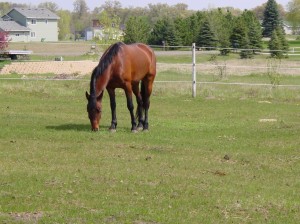Supplementing Horse Diets with Omega Fatty Acids

As you look at your horses’ diet, it is important to remember that horses need a balance of both omega-3 and -6 fatty acids for optimal health and performance. One isn’t necessarily better than the other; they simply have different roles in the body and must be in balance with each other for optimal health.
The Role of Omega-3 and Omega-6 Fatty Acids in Horses’ Diets
As herbivores and nomadic grazers, horses are naturally adapted to a diet rich in omega-3 fatty acids (ALA). The little bit of fat found in forages, particularly fresh pasture, is naturally high in ALA (omega-3) whereas oils from some grains and seeds tend to be higher in LA (omega-6).
Total diets (forage + grain concentrates + supplements/treats) that include supplemental fat in addition to grain concentrates tend to have a total dietary fatty acid ratio that provides higher omega-6 fatty acids to omega-3 fatty acids.
Achieving the Ideal Omega Fatty Acid Ratio
Scientists have not yet pinpointed the ideal total dietary intake or ratio of omega-3 and omega-6 fatty acids for horses. Limited research suggests that providing supplemental sources of ALA or EPA/DHA, in addition to a well-balanced forage plus grain concentrate, may provide some key benefits to your horse. Start by basing your horse’s diet on a good quality forage plus a quality complimentary feed that provides omega 6 and omega 3 fatty acid guarantees on the feed tag .
Benefits of Supplementing Omega Fatty Acids
Supplementation on top of what the base diet is providing may be worth discussing with a trusted equine veterinarian or nutritionist when supporting horses with pro-inflammatory conditions (e.g. skin allergies or hypersensitivity, joint pain, etc.).
Implementing Dietary Changes and Realistic Expectations
As always, when adding dietary supplements to the horses feeding program, make sure the total diet (forage + concentrates/treats) stays balanced and that changes are made gradually so the horse’s digestive track has time to adjust. Benefits from providing omega fatty acids in the diet are not realized immediately, but take 30-90 days of supplementation before benefits are detectable, so be patient and make sure your expectations are realistic.
DIETARY SOURCES OF POLYUNSATURATED FATTY ACIDS | |
| Omega-6 fatty acids | Omega-3 fatty acids |
| Corn oil (LA) | Flaxseed (linseed) oil (ALA) |
| Safflower oil (LA) | Fish oil (EPA, DHA) |
| Rice bran oil (LA) | Soybean oil (ALA) |
| Sunflower oil (LA) | Canola oil (ALA) |
| Borage (starflower) oil (LA) | Mustard oil (ALA) |
| Cottonseed oil (LA) | |
| Grapeseed oil (LA) | |
| Peanut oil (LA) | |
| Primrose oil (LA) | |
| Sesame oil (LA) | |
| Soybean oil (LA) | |
Learn more about our feeds formulated specifically for hard keepers to ensure your horse is getting the optimum nutrition to maintain their weight and health at feeding time, every time.
